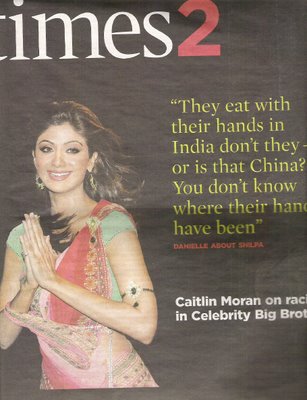
Too beautiful for you...
The Bollywood film star Shilpa Shetty. Too beautiful, too graceful, too classy, too well brought up, too successful and too rich - for the trio of ill educated and pig ignorant coven of witches in the Celebrity Big Brother house.
And apparently, too INDIAN.
Danielle Lloyd (a disgraced 'beauty' queen and all round ugly human being who dates footballer Teddy Sherringham - poor him);
Jade Goody (uneducated daughter of a disaster-mother. Jade made her name and fortune (£8m) from parading her stupidity, first as a contestant on Big Brother back in 2002 and came back into a Celebrity BB House (other occupants included Jermaine Jackson, Dirk Benedict of The A Team and Ken Russell who made films like Women in Love) as Britain's most prized representative in the house, which says a lot about the country. Jade boasted about being the "25 most infulenshal person in the world" - she meant 'influential'. Big Brother turned the notion of celebrity on its head, turning 'real' celebrities who became famous for doing things, into 'servants' for the lowest form of humanity that is Jade's family. The family includes her abhorrent boyfriend whose dimness and total void of personality is without compare.
Concluding the trio was Jo O'Meara, formerly of the now defunct manufactured pop band S Club 7. Jo, probably the plainest pop star you'll ever see ("hatchet-faced" & "boot-faced" are some of the descriptions of Jo in the papers this last week).
So Danielle (a WAG), Jade (a reality TV creation) and Jo (a manufactured non-star) held themselves high and persistently bullied and racially sniped at Shilpa - a superstar in the world's biggest film industry and to one billion Indians.
The horrific show started with Jade's mum, Jackiey, who in SKY News-speak, "was unable" (she was "unwilling" would be more accurate) to pronounce Shilpa's name. Jo made one of the most unforgivable comments. Complaining about chicken which they alleged was undercooked and made them go to the toilet, Jo suggested that must be how they cook in India, adding: "That's why [Indians] are all so thin, because they are sick all the time."
Yet, Britain chooses to debate whether the vicious attacks on Shilpa was racism, with some saying it's only bullying. In the words of Channel 4, no "unambiguous" or "overt" racism had taken place on the programme, by which one may conclude that they agree that 'ambiguous' and 'covert' racism had occured. It seems that unless someone spits an out-and-out racist abuse at you to your face, or they kill or beat you while at the same time declaring (for the avoidance of doubt!) that it is because you are of so-and-so colour, it is not racist!
But these 'ambiguous' and 'covert' racist attitudes/comments are what ethnic minority people put up with in Britain everyday from people who don't consider themselves racist - because they don't belong in any extremist far right groups.
That Jade got voted off the show was a reaffirmation of the decency of most Britons; that her career will be salvaged by the media manipulation that kicked into gear on her eviction, means nothing really changes.
In tormeting Shilpa so savagely, Jade and her pack have handed the Bollywood actress the biggest gift of her career. The so-called unpronounceable, name (Shilpa; what's so difficult in that?) is now known in every household in the Britain and the news-watching/reading world. It's as well-known as 'Cindy' now. She is on the way to becoming an even bigger star than she could have imagined, and the beautiful thing is, she is blissfully unaware of all this, for now.
Reassuring things about Celebrity Big Brother
- Jermaine Jackson has shown that - in the words of one British journalist - "you don't have to be a fruitcake to be a Jackson." Jermaine has been a tower of strength to Shilpa in very trying circumstances, forming what may become a lifelong friendship.
- The row provided a coup for the Indian Tourist Office who placed full page adverts in newspapers inviting Jade & friends to come and experience the "healing" powers of 'Incredible India' where they can learn to eat with their hands - "half of the world's population does."
- Controversial Race chief, Trevor Phillips (once accused of making statements better suited to the far right BNP) spoke up straight this time, declaring that there is no doubt what happened to Shilpa was racism, demanding that Channel 4 must act on the controversy. For once, Phillips and Mayor Ken Livingstone agree on something.
- Shilpa will most likely win Celebrity Big Brother (I for one will vote for her) and when she comes out of the house, her fame will go through the stratosphere, extending to the Western World to compete with the Madonnas and Angelina Jolies, and she will deserve it.
Both Jade and 'covert' racism are mentioned in an article of mine about Big Brother, published on Nigeria2Day Online on 5th August 2003. I wrote then that Big Brother would run and run; I have changed my mind. I would be happy to be rid of this "racism presented as entertainment" [to quote Culture Secretary Tessa Jowell].
Excerpt from my 2003 opinion piece, below...
As British as they are, BBUK's Black and Asian contestants have not stood a chance of winning. In series one, black Darren helped prove beyond doubt that the machiavellian Nick was cheating. Nick got his just deserts and was sent packing but Darren became the fall guy and caucasian Craig - who spent most of the series in blissful sleep - won. That same year we had mixed race Mel, a graduate of Psychology and arguably the most intelligent girl ever in BBUK. She was entertaining and stayed true to herself, only to be derided by the great British public as a slut. True enough, she inspired the first erection ever on terrestrial TV in the UK, albeit seen only through the veneer of a pair of shorts. Mel, nevertheless, was no more sluttish than many of the other girls in the house.
It is therefore difficult not to detect a covert racism at work in the UK show. Then there was America, where the race issue blew up in an explosive way during the first series. Big Brother Africa therefore has the possible advantage of a level playing field where race will not be too negative a factor.
BBUK has helped highlight how British society worships the mediocre and rewards stupidity. British newspapers and magazines are full of celebrities who are startling in their ordinariness; exemplified by the vacuous Victoria Beckham who, despite being the most devoid of talent in the now defunct Spice Girls, has become a superstar. The shambolic state of British education is also laid open in BBUK, most notably by Jade in the third series. The daughter of a one-armed lesbian and a father behind bars, Jade passed through the British school system knowing nothing, but came on Big Brother thinking she was the bees knees. Try getting your head round the fact that she has made more money out of the show than that year's winner.
While the ordinary is too highly regarded in Britain, the sad fact is that it is not celebrated enough in Nigeria, or the rest of Africa for that matter. The $100,000 prize money on offer in BBA compares favourably with the UK's £70,000, and represents the kind of extreme good luck that the ordinary African does not normally come across. Part of the lure of the West for Africa's youth is the possibility it affords the individual to seize upon the dream chance. Big Brother offers such a chance, within reach, on African soil. This big break, fostered neither by power nor privilege, is long overdue.
BBUK series 2 has been the most satisfying so far. Its winner was the mass of contradictions that was Brian: sensitive, gay, catholic, childlike and insecure - with a god-given talent for making people laugh. Then there was Helen, a blonde hairdresser unencumbered with much by way of brain matter. A Welsh Marilyn Monroe, she was guileless and adorable, prompting one of her housemates to tell Big Brother memorably: Helen is full of uncomplicated goodness.
Helen came into the house talking of her boyfriend on the outside, Big G, but gradually became drawn to another housemate, Paul - in a romance that gripped the nation. It was love and it happened in front of our very eyes. Two years on, Helen and Paul are still together. The last word goes to the unwanted Big G who observed pathetically: I have been shat upon!
The finale was a nail-biting finish between the two babies of the house, the runaway favourites, Helen and Brian. We watched live as they held hands and told each other how lucky they were to get this chance, and how it didnt matter anymore which of them won. It was beautiful television, as only Big Brother knows how.
Who knows what moments of transcendence may yet come out of Big Brother Africa? Who knows what the mirror it holds up to our society will reveal? We may not like what we see but much of it will be the truth. A great hue and cry greeted the first series of BBUK, most of the sceptics have since joined up with Big Brother's happy band. Come next year, the Big Brother fever will spread again. I cannot promise that I will not succumb.

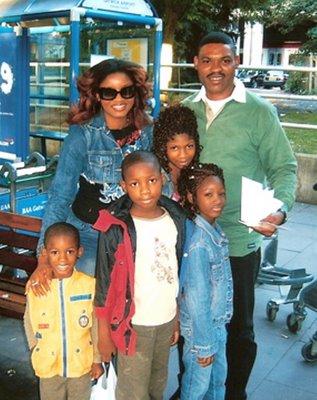

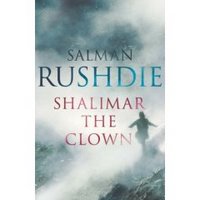
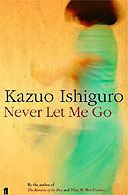
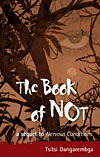 Helon Habila
Helon Habila 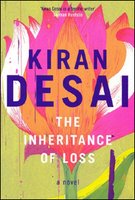
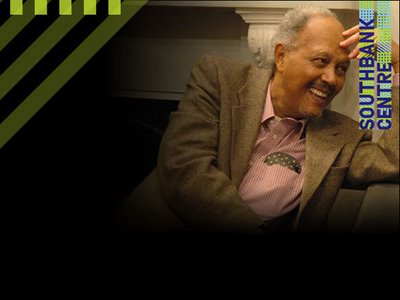
 5.30pm - Dream to Change the World
5.30pm - Dream to Change the World




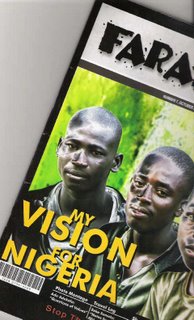


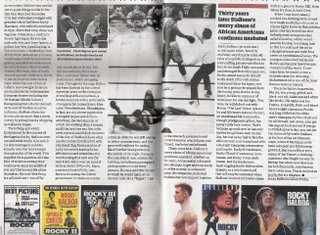


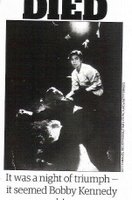
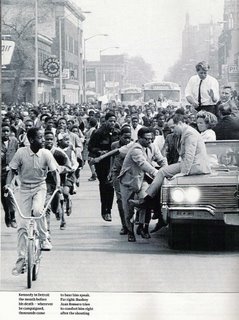
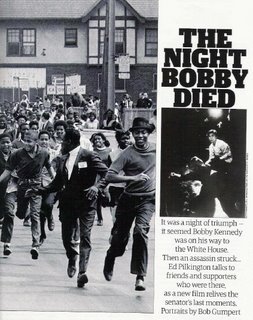


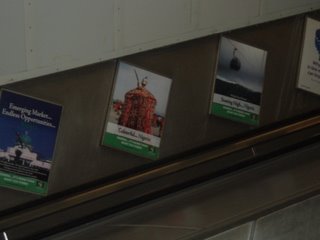



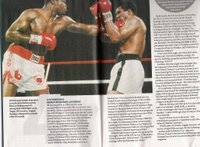










.jpg)




